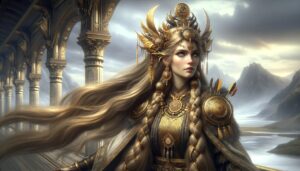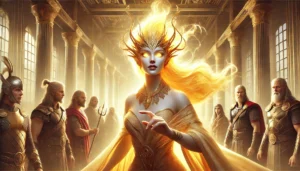Table of Contents
In the rich tapestry of Norse mythology, few figures shine as brightly as Sif, the golden-haired goddess and wife of the mighty Thor, the god of thunder. Sif’s story is one of beauty, resilience, and loyalty, and her presence in the pantheon of Norse deities adds depth and complexity to the myths and legends of the ancient North.
Origins and Family
Sif’s heritage roots itself in the world of the Aesir, one of the two primary tribes of Norse gods. She frequently associates herself with the earth and fertility, symbolizing the nurturing facets of the natural world. Norse mythology deeply intertwines Sif’s lineage with a broader tapestry of divine beings.
Sif’s most prominent familial connection is, of course, her marriage to Thor, the mighty god of thunder and one of the principal Aesir deities. However, their story goes beyond mere matrimony and dives into the realm of loyalty, love, and shared adventures.
In addition to their enduring relationship, Thor and Sif are often portrayed as parents to two children in some interpretations of Norse mythology. Their children, Magni and Modi, inherit their father’s strength and bravery, further emphasizing the legacy of this divine couple.
Appearance

Sif possesses her most distinctive feature in her shimmering golden hair, often describing it as radiant as the sun itself. Her hair transcends being a mere physical attribute; it symbolizes her beauty and vitality. Folklore describes her hair as gleaming like a field of wheat in the summer sun, testifying to her connection with agriculture and fertility.
Depictions of Sif typically portray her as a graceful and regal goddess, radiating an aura of strength and poise. She frequently adorns herself with garments embellished with symbols of fertility and growth, further accentuating her role in the natural world.
Abilities
While Sif is not as renowned for her combat prowess as some of the other Norse deities, she possesses unique abilities and qualities that make her a formidable figure in her own right. Her connection to the earth grants her the power to nurture and cultivate the land, ensuring bountiful harvests and the well-being of mortal farmers.
Sif’s golden hair possesses a special significance as well. Folklore asserts that her hair wields the power to instigate rejuvenation and growth, establishing it as a symbol of hope and renewal within Norse myths. Certain interpretations even ascribe healing properties to her hair, enabling it to restore health and vitality to those in need.
Symbols Representing Sif

Undoubtedly, Sif’s most iconic symbol remains her golden hair, signifying not only her beauty but also her responsibility for guaranteeing the earth’s prosperity. This radiant hair serves as a symbol of fertility and abundance, frequently linking it with the golden fields of grain that sustain the Norse people.
Besides her hair, depictions of Sif occasionally portray her holding a sheaf of wheat or a basket of ripe fruits, reinforcing her association with agriculture and the land’s bounty. These symbols accentuate her role in securing the well-being of both gods and mortals.
Sif’s Shining Resurrection and the Birth of Mjölnir
Sif’s presence in Norse mythology is not limited to her role as Thor’s wife; she also plays a vital part in several prominent myths and stories. One of the most famous tales involving Sif revolves around the mischievous trickster god Loki.
Loki’s Devious Prank
The tale begins on a day when mischief was stirring in the realm of the gods. Loki, the trickster of the Aesir, had a penchant for playing pranks and causing trouble. On this particular day, he hatched a cunning plan to both amuse himself and provoke a reaction from the other gods.
During a moment when Sif briefly parted from her cherished golden hair, Loki seized the opportunity to execute his mischievous deed. While she attended to other matters, perhaps tending to her duties or savoring a tranquil moment, Loki surreptitiously advanced toward her, employing a pair of specially crafted scissors. These scissors possessed an enchantment imbued with subtle malevolence, intending to cut hair with unparalleled precision.
As Sif’s radiant golden locks cascaded around her, Loki carefully snipped them away, strand by strand. Each strand of hair shimmered like spun gold, making it all the more heartbreaking to see them fall to the ground. Loki’s actions were not only mischievous but also malicious, as he knew the significance of Sif’s hair to both her and Thor.
Thor’s Fierce Reaction

When Sif discovered the loss of her golden hair, her heart sank. The beauty and vitality of her hair were a source of pride and symbolized her connection to the earth’s fertility. Sif’s distress was palpable, and the news quickly reached Thor’s ears.
Thor, who was fiercely protective of his wife and deeply devoted to her, was consumed by anger upon learning of Loki’s treacherous act. He wasted no time in seeking out the trickster god, determined to make him pay for the harm he had caused to Sif and her reputation.
Thor’s Discovery
Thor was not known for his subtlety or cunning, but he possessed a unique and powerful ability that aided him in this situation: Mjölnir, his mighty hammer. With Mjölnir in hand, Thor confronted Loki, demanding an explanation for the heinous act. Loki, initially trying to evade responsibility, soon realized he couldn’t deceive Thor with his usual tricks.
Thor’s keen intuition and unyielding determination allowed him to see through Loki’s façade. The god of thunder recognized the guilt and mischief in Loki’s eyes and, with an undeniable sense of righteousness, forced Loki to admit to his crime.
Realizing the gravity of his actions and the wrath of Thor, Loki ultimately agreed to make amends, promising not only to restore Sif’s hair but to do so with even more magnificent locks. This marked a turning point in the story, as Loki’s cunning was redirected toward righting his wrongs, resulting in the creation of Sif’s new golden hair and the forging of other legendary artifacts, including Thor’s powerful hammer, Mjölnir.
In this tale, Loki’s cunning mischief sets the stage for a series of events that showcase both the depths of Thor’s loyalty and love for Sif and Loki’s ability to make amends for his transgressions through clever means. It is a story that underscores the complex relationships and dynamics within the pantheon of Norse gods and adds layers of depth to the characters involved.
Cultural Impact
Sif’s character has left a lasting impact on Norse mythology and its cultural legacy. Her connection to fertility and agriculture reflects the profound importance of these themes in the lives of the ancient Norse people. She symbolizes the delicate balance between nature and humanity, reminding us of the dependence of mortals on the earth’s bounty.
Sif’s story also serves as a reminder of the power of loyalty and love, even in the face of adversity. Her unwavering commitment to Thor and her ability to forgive Loki’s transgressions resonate with themes of trust and forgiveness that are universal and enduring.
Thematic Exploration: Sif’s character lends itself to several thematic explorations, including beauty, fertility, and the interconnectedness of the natural world. Her golden hair is a potent symbol of beauty and femininity, but it also represents the cyclical nature of life and death, where crops are sown and harvested in an eternal cycle of renewal.
Furthermore, Sif’s role as a nurturing goddess aligns with the broader theme of the earth as a mother figure in many mythologies. She embodies the idea of the land providing for its people and highlights the importance of honoring and respecting the environment.
Conclusion
Sif, the golden-haired goddess and wife of Thor, is a central figure in Norse mythology, embodying themes of beauty, fertility, loyalty, and the interdependence of gods and mortals. Her radiant hair and her role as a protector of the earth’s bounty make her a symbol of hope and abundance in the Norse pantheon. Through her stories and symbolism, Sif continues to inspire us to cherish the beauty of the natural world and to nurture our bonds of love and loyalty.
FAQ
Who is Sif's husband?
Sif is married to Thor, the god of thunder.
What is the significance of Sif's golden hair?
Sif's golden hair symbolizes her beauty, fertility, and its power to bring growth and renewal.
What is Sif's role in Norse mythology?
Sif is associated with agriculture and the well-being of gods and mortals.
How did Loki play a prank on Sif?
Loki cut off Sif's golden hair in a mischievous act.
What was Thor's reaction to Sif's hair being cut?
Thor was furious and demanded Loki rectify his actions.
How did Loki make amends for cutting Sif's hair?
Loki sought the help of dwarves to create new, even more magnificent hair for Sif.
Are there any children of Thor and Sif?
Yes, Thor and Sif are often considered the parents of two children in Norse mythology, Magni and Modi.




